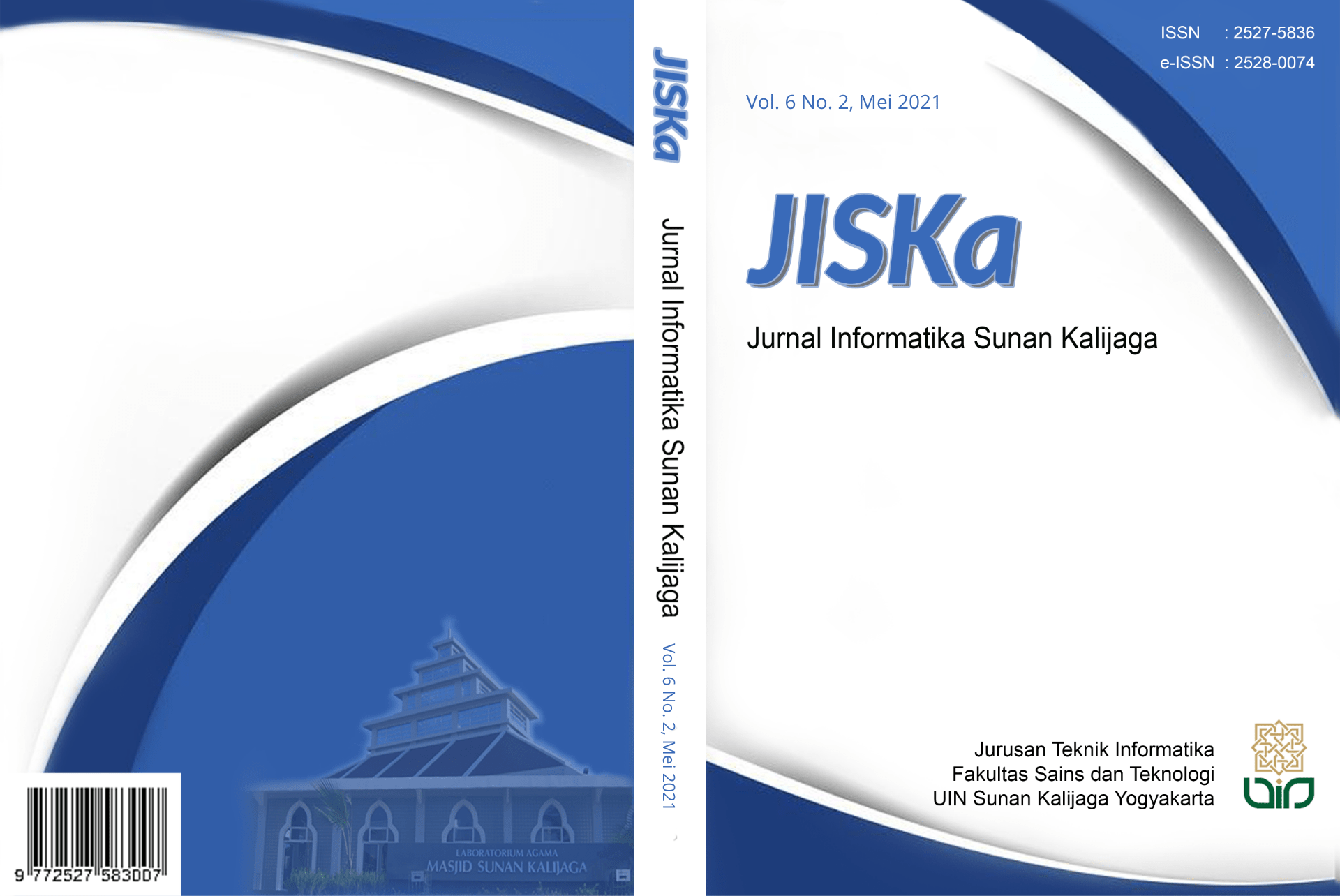Deteksi Dini Mahasiswa Drop Out Menggunakan C5.0
DOI:
https://doi.org/10.14421/jiska.2021.6.2.113-119Abstract
The decline in the number of active students also occurred at the Faculty of Engineering and Information Technology, Universitas Jenderal Achmad Yani. This greatly affects the profile of study program graduates. So it is necessary to have a system that is able to detect students who are threatened with dropping out early. In this study, the attributes chosen were the student's GPA and the percentage of attendance . This attribute is used to classify students who are predicted to drop out. The research data uses student data from the Faculty of Engineering and Information Technology, Universitas Jenderal Achmad Yani. This study uses the C5.0 algorithm to build a decision tree to assist data classification. The decision tree that was built with 304 data as training data resulted a C5.0 decision tree which had an error rate of 5%. The accuracy results obtained from the 76 test data is 93%.References
Aesyi, U. S., Diwangkara, T. W., & Kurniawan, R. T. (2020). Diagnosa Penyakit Disk Hernia Dan Spondylolisthesis Menggunakan Algoritma C5. Telematika, 16(2), 81. https://doi.org/10.31315/telematika.v16i2.3181
Aesyi, U. S., & Wardoyo, R. (2019). Prediction of Length of Study of Student Applicants Using Case Based Reasoning. IJCCS (Indonesian Journal of Computing and Cybernetics Systems), 13(1), 11. https://doi.org/10.22146/ijccs.28076
Ahmadi, E., Weckman, G. R., & Masel, D. T. (2018). Decision making model to predict presence of coronary artery disease using neural network and C5.0 decision tree. Journal of Ambient Intelligence and Humanized Computing, 9(4), 999–1011. https://doi.org/10.1007/s12652-017-0499-z
Alban, M., & Mauricio, D. (2019). Predicting University Dropout trough Data Mining: A systematic Literature. Indian Journal of Science and Technology, 12(4), 1–12. https://doi.org/10.17485/ijst/2019/v12i4/139729
Cahyo, P. W. (2018). Klasterisasi Tipe Pembelajar Sebagai Parameter Evaluasi Kualitas Pendidikan Di Perguruan Tinggi. Teknomatika, 11(1), 49–55.
Gustian, D., & Hundayani, R. D. (2017). Combination of AHP Method with C4.5 in the level classification level out students. 2017 International Conference on Computing, Engineering, and Design (ICCED), 1–6. https://doi.org/10.1109/CED.2017.8308098
Kastawan, P. W., Wiharta, D. M., & Sudarma, M. (2018). Implementasi Algoritma C5.0 pada Penilaian Kinerja Pegawai Negeri Sipil. Majalah Ilmiah Teknologi Elektro, 17(3), 371. https://doi.org/10.24843/MITE.2018.v17i03.P11
Khasanah, A. U., & Harwati. (2017). A Comparative Study to Predict Student’s Performance Using Educational Data Mining Techniques. IOP Conference Series: Materials Science and Engineering, 215, 012036. https://doi.org/10.1088/1757-899X/215/1/012036
Morales, A. C., Amir, O., & Lee, L. (2017). Keeping It Real in Experimental Research—Understanding When, Where, and How to Enhance Realism and Measure Consumer Behavior. Journal of Consumer Research, 44(2), 465–476. https://doi.org/10.1093/jcr/ucx048
Mutrofin, S., Khalimi, A. M., Kurniawan, E., Ginardi, R. V. H., Fatichah, C., & Sari, Y. A. (2019). Detection of Potentially Students Drop Out of College in Case of Missing Value Using C4.5. 2019 International Conference on Sustainable Engineering and Creative Computing (ICSECC), 349–354. https://doi.org/10.1109/ICSECC.2019.8907014
Nia, F. Y., & Khalili, M. (2015). An efficient modeling algorithm for intrusion detection systems using C5.0 and Bayesian Network structures. 2015 2nd International Conference on Knowledge-Based Engineering and Innovation (KBEI), 1117–1123. https://doi.org/10.1109/KBEI.2015.7436203
Ojha, U., Jain, M., Jain, G., & Tiwari, R. K. (2017). Significance of important attributes for decision making using C5.0. 2017 8th International Conference on Computing, Communication and Networking Technologies (ICCCNT), 1–4. https://doi.org/10.1109/ICCCNT.2017.8204031
Putra, A. (2017). SOLUSI PREDIKSI MAHASISWA DROP OUT PADA PROGRAM STUDI SISTEM INFORMASI FAKULTAS ILMU KOMPUTER UNIVERSITAS BINA DARMA. Simetris: Jurnal Teknik Mesin, Elektro dan Ilmu Komputer, 8(1). https://doi.org/10.24176/simet.v8i1.893
Rajeswari, S., & Suthendran, K. (2019). C5.0: Advanced Decision Tree (ADT) classification model for agricultural data analysis on cloud. Computers and Electronics in Agriculture, 156, 530–539. https://doi.org/10.1016/j.compag.2018.12.013
Susanti, Y., Respatiwulan, Handajani, S. S., Pratiwi, H., Slamet, I., Hartatik, & Istiqomah, F. (2019). Classification of teak wood production in Central Java using the C5.0 algorithm. AIP Conference Proceedings, 2202(1), 020094. https://doi.org/10.1063/1.5141707
Sutanto, E. M. (2017). The influence of organizational learning capability and organizational creativity on organizational innovation of Universities in East Java, Indonesia. Asia Pacific Management Review, 22(3), 128–135. https://doi.org/https://doi.org/10.1016/j.apmrv.2016.11.002
Utari, M., Warsito, B., & Kusumaningrum, R. (2020). Implementation of Data Mining for Drop-Out Prediction using Random Forest Method. 2020 8th International Conference on Information and Communication Technology (ICoICT), 1–5. https://doi.org/10.1109/ICoICT49345.2020.9166276
Downloads
Published
Issue
Section
License
Copyright (c) 2021 Ulfi Saidata Aesyi, Alfirna Rizqi Lahitani, Taufaldisatya Wijatama Diwangkara, Riyanto Tri Kurniawan

This work is licensed under a Creative Commons Attribution-NonCommercial 4.0 International License.
Authors who publish with this journal agree to the following terms as stated in http://creativecommons.org/licenses/by-nc/4.0
a. Authors retain copyright and grant the journal right of first publication with the work simultaneously licensed under a Creative Commons Attribution License that allows others to share the work with an acknowledgement of the work's authorship and initial publication in this journal.
b. Authors are able to enter into separate, additional contractual arrangements for the non-exclusive distribution of the journal's published version of the work (e.g., post it to an institutional repository or publish it in a book), with an acknowledgement of its initial publication in this journal.
c. Authors are permitted and encouraged to post their work online (e.g., in institutional repositories or on their website) prior to and during the submission process, as it can lead to productive exchanges, as well as earlier and greater citation of published work.










